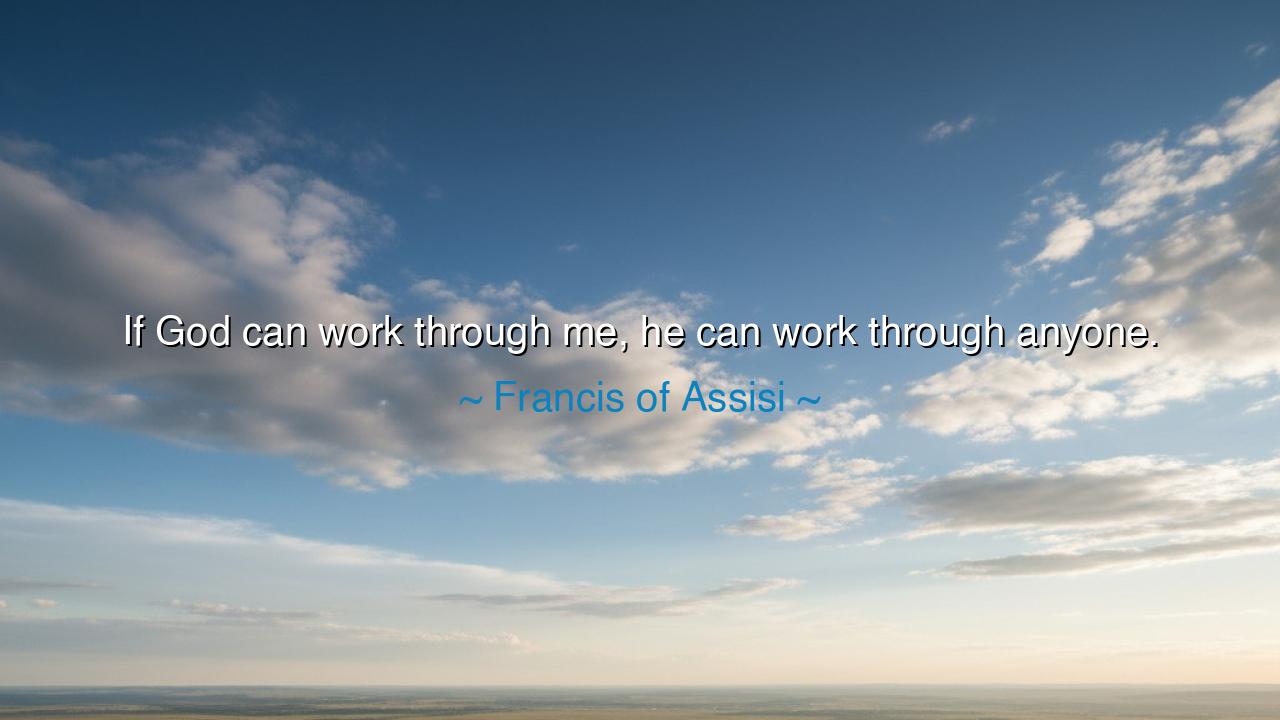
If God can work through me, he can work through anyone.






"If God can work through me, He can work through anyone." — These humble and radiant words from St. Francis of Assisi shine with the brilliance of divine simplicity. They carry the fragrance of humility, the strength of faith, and the wisdom of a soul that has truly walked with God. In this statement, Francis — the saint of peace, poverty, and creation — speaks not of his greatness, but of his smallness. He reminds us that the Almighty does not choose the worthy; He makes worthy those whom He chooses. The grace of God, like sunlight, is not reserved for saints and scholars, but falls upon all who are willing to receive it. The secret lies not in perfection, but in surrender — in allowing the Creator to shape one’s life as clay in the hands of the Potter.
The origin of these words arises from the life of Francis himself, a man once consumed by vanity, wealth, and pride. Born into comfort and privilege in the Italian town of Assisi, Francis sought glory in war and pleasure in luxury. But when he returned from battle broken and disillusioned, he began to hear the whisper of God calling him to a higher purpose. Standing before a crumbling chapel, he heard the voice of Christ say, “Francis, rebuild my church.” At first, he thought this meant repairing the stones of a ruined building, but soon he realized it was his own soul — and the souls of others — that God wished to restore. From that moment, Francis turned away from his riches and embraced a life of poverty, compassion, and faith. That such a transformation could spring from one so flawed and ordinary became proof to the world that the Divine can indeed work through anyone.
Through his humility, Francis became a vessel of divine power. He spoke not with eloquence, but with the purity of heart that moves mountains. He tended to lepers, preached to birds, and called the sun, moon, and earth his brothers and sisters. His heart was aflame with love — not just for God, but for every living thing. Yet even as miracles surrounded his life — the taming of a wolf, the stigmata that marked his body — Francis never saw himself as special. He saw himself as a mirror, reflecting the light of the Creator. His message was simple: if God could use someone as weak and sinful as he once was, then no one is beyond redemption. In that humility lies the strength of the quote, a message that has echoed for centuries.
Consider how this truth has unfolded in others who followed his path. John Newton, once a slave trader, was transformed by divine mercy into a preacher and the author of the hymn “Amazing Grace.” Like Francis, Newton saw the depths of his own sin and the height of God’s compassion. His transformation became living proof that the Divine can redeem and work through even the most broken of souls. Such stories remind us that greatness in the eyes of Heaven is not earned by power, wealth, or intellect, but by humility and faith. When a person says, “Here I am, Lord — use me,” they open the door through which God can move mountains.
The lesson of Francis’s words is as timeless as it is profound: do not underestimate what God can do through you. The smallest act of kindness, the gentlest word of love, the simplest prayer spoken in sincerity — all become instruments of divine will. The world often teaches us to look for strength in brilliance, beauty, or power, but the truth is that God delights in using the humble and the broken. The proud heart closes itself to grace, but the humble heart becomes a channel of miracles. In this way, Francis’s life becomes both an invitation and a challenge — to make oneself small, so that God’s greatness may flow freely through one’s life.
To live this truth is to trust, to believe that even in our weakness, we can serve a higher purpose. You need not be perfect to do good; you need only be willing. When you speak kindly to the lonely, you become the voice of compassion. When you forgive those who wrong you, you become an instrument of peace. When you share what little you have, you reflect the abundance of Heaven. This is the way of Francis — the way of humble service through which God’s light enters the world.
Therefore, remember always: the power of God is not limited by your flaws. The same Spirit that transformed a vain youth of Assisi into a saint of eternal renown can transform you, too. Let faith replace fear, let humility open your heart, and let love guide your actions. For if God could work through Francis — a man who once sought glory and found grace — then He can, and will, work through you. And when you let that divine light shine, you too will become a living witness to this eternal truth: that the smallest soul, when surrendered to God, can become the greatest vessel of His glory.






AAdministratorAdministrator
Welcome, honored guests. Please leave a comment, we will respond soon